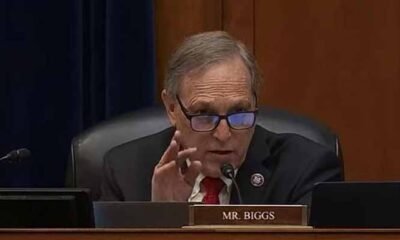election 2026
Key Measure Set to Transform GOP’s 2026 Governor Race Gathers Momentum

In a politically charged move, the GOP head of the Arizona Freedom Caucus, Sen. Jake Hoffman, is pushing legislation that could prevent fellow Republican Karrin Taylor Robson from holding the office of governor, even if she wins the upcoming election.
The legislation, known as HCR 2037, was approved by the Senate Government Committee recently but does not mention Robson directly. Instead, it establishes a criterion disqualifying anyone who has lobbied in the two years preceding the primary from serving as an elected state official.
Robson, a registered lobbyist with AZ Strategies LLC, falls under this restriction. She has represented clients, including Arizona Public Service (APS), although APS claimed she ceased work with them last year. Resolution Copper Co. indicated she served as a lobbyist until recently.
When presenting the measure, Hoffman emphasized the importance of preventing lobbyists from quickly transitioning into powerful government roles. “The public has an overwhelming distrust of paid lobbyists,” he stated. “This legislation seeks to protect public confidence in government.”
While Hoffman claimed the measure was not solely targeted at Robson, he acknowledged her influence in crafting the proposal. His support for U.S. Rep. Andy Biggs, who is also vying for the Republican gubernatorial nomination, raises questions about the legislation’s timing and intent.
If passed, the measure would need to be ratified by voters in the Nov. 3, 2026 election. Notably, it stipulates that individuals with lobbying backgrounds in the two years before the primary will be ineligible to assume office if elected. While it does not disqualify Robson from running, it could prevent her from being sworn in if the legislation is ratified.
Hoffman criticized the optics of a candidate associated with significant lobbying efforts, hinting at potential voter unease. Robson, however, dismissed the measure as a “desperate political tactic,” asserting it lacks legal validity.
The discussion surrounding HCR 2037 could drastically alter Robson’s political trajectory. All eyes will be on how the Legislature responds, as support for Robson exists among other members of her party, complicating Hoffman’s push against her.
Additionally, the introduction of the lieutenant governor role complicates the matter further; if a winning gubernatorial candidate cannot take office, the lieutenant governor would ascend. This new dynamic in Arizona politics adds layers of complexity to a tense political landscape.
Robson’s previous campaign efforts were buoyed by endorsements, including recognition from former President Donald Trump, who encouraged her gubernatorial run during an event in Phoenix last December. However, her path forward remains fraught with political challenges as Biggs’ candidacy gains traction.


















